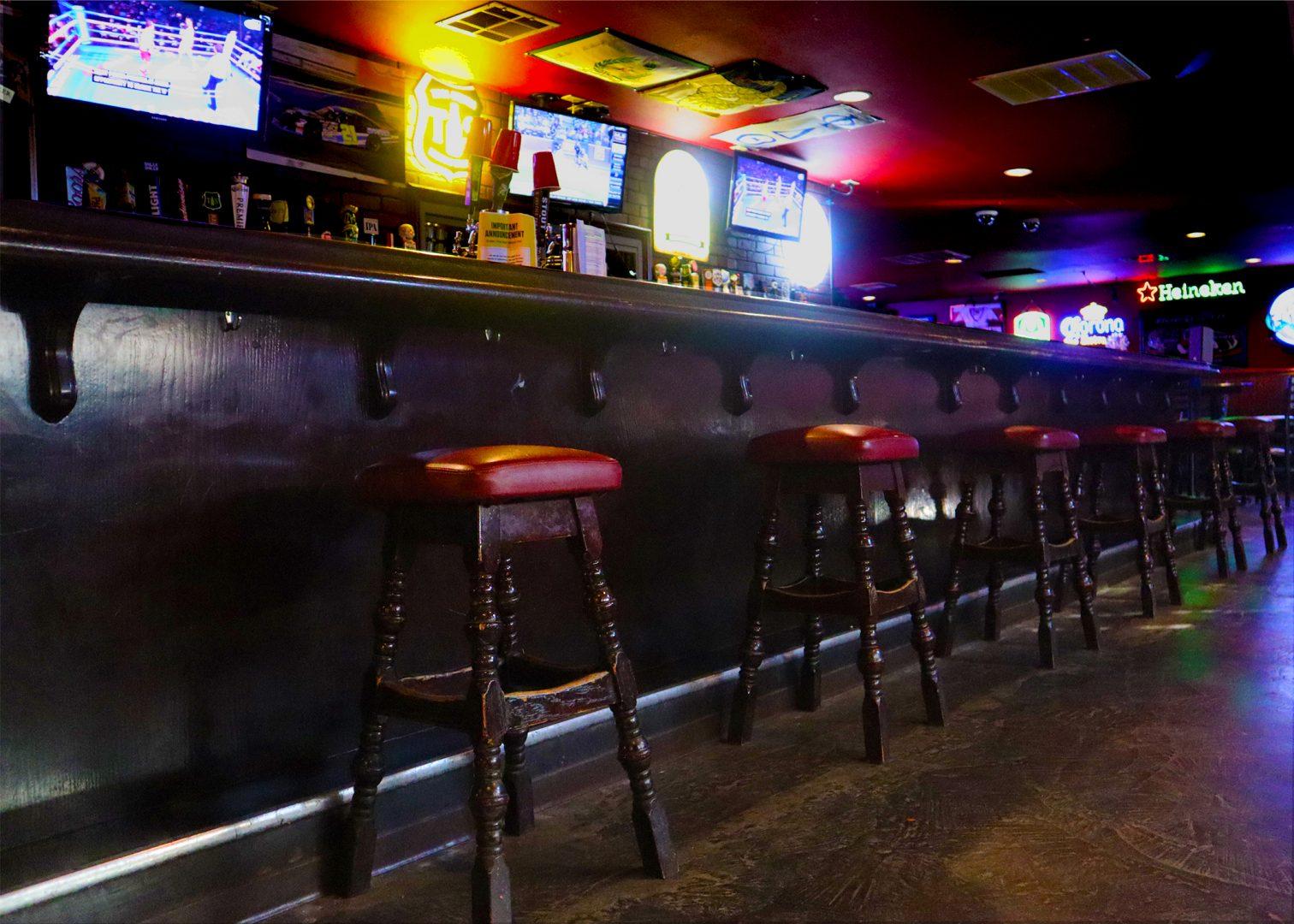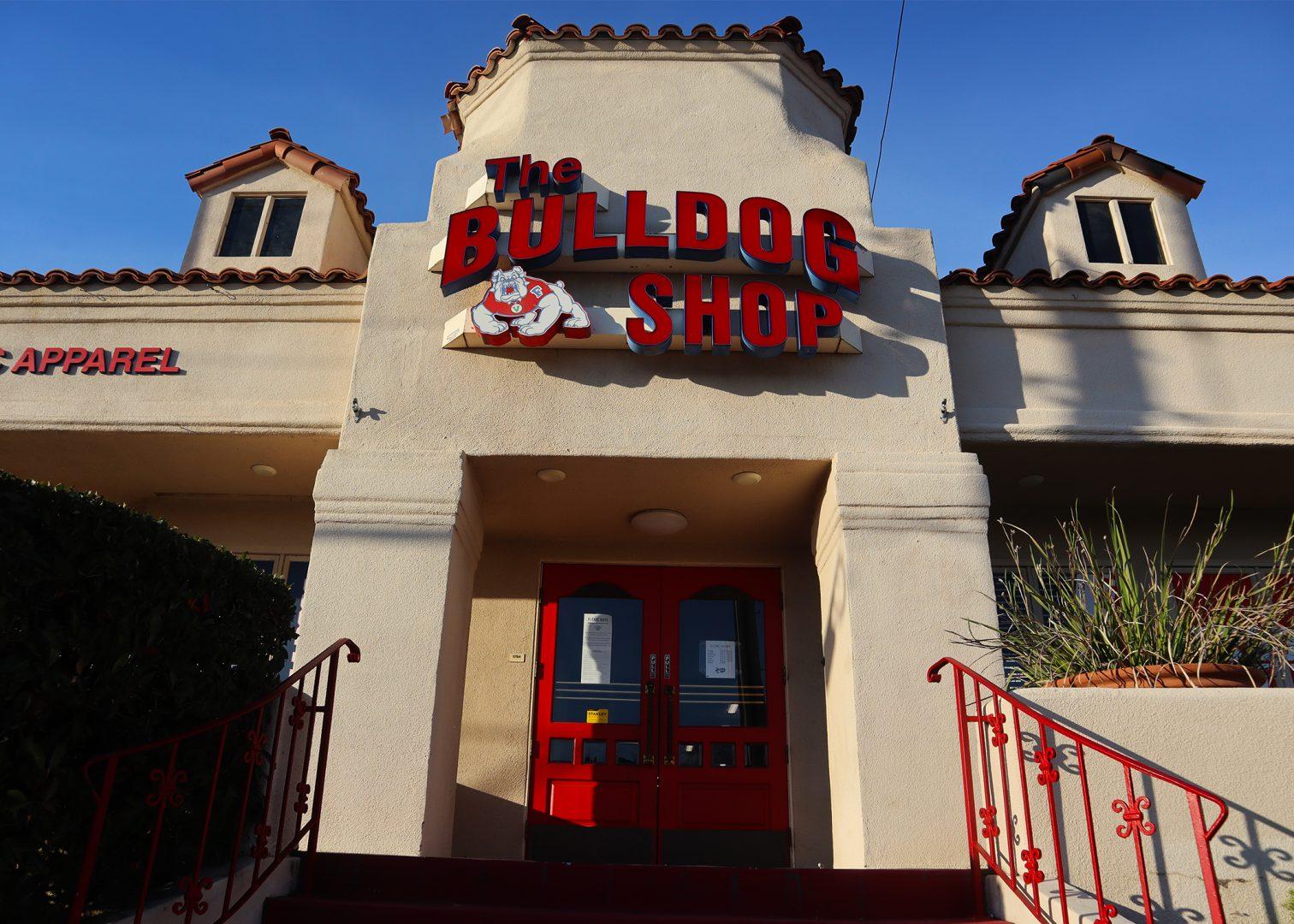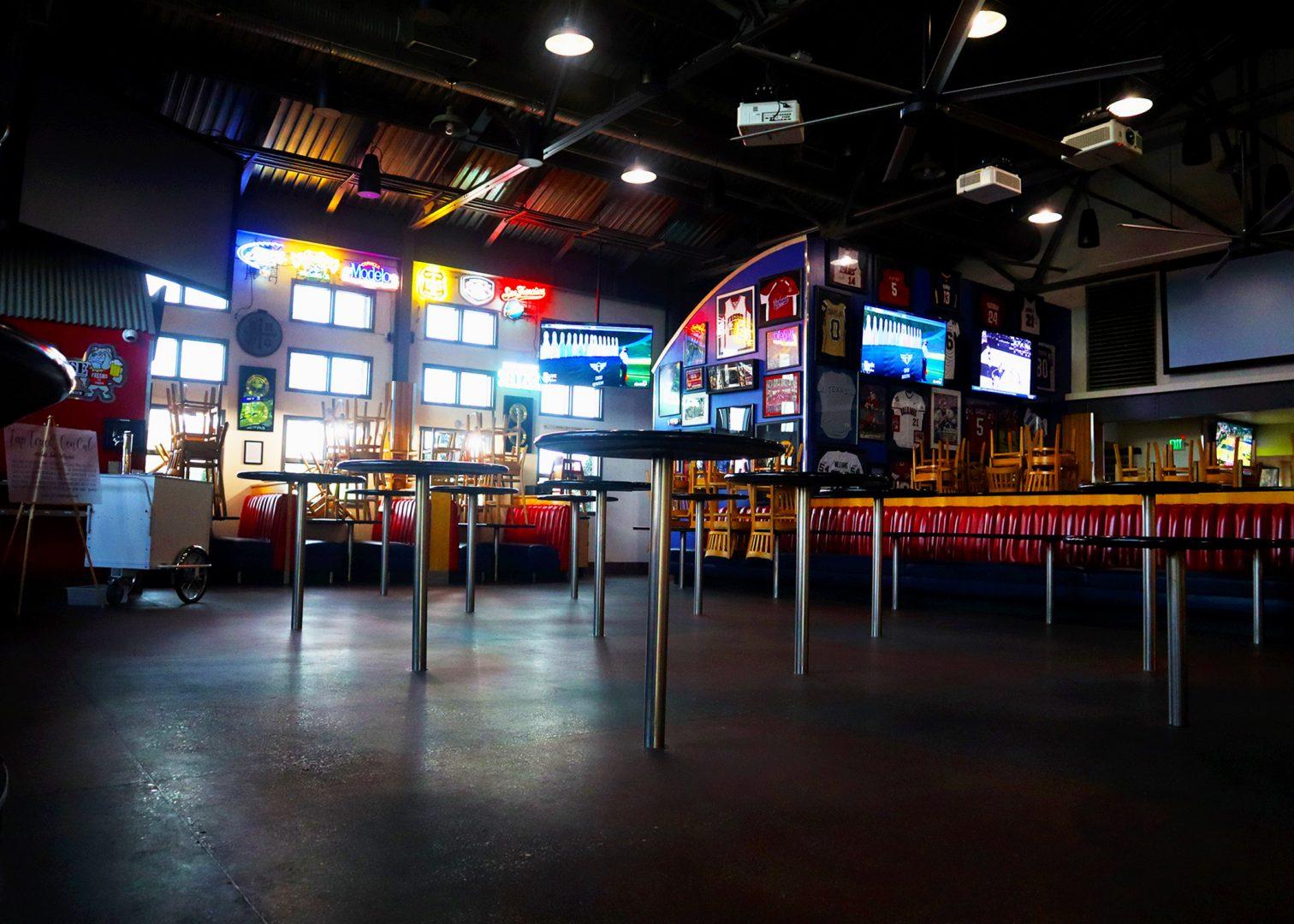A typical Fresno State football gameday brings life to the businesses along Shaw and Cedar avenues — a bustling crowd at the Red Wave Inn bar enjoying drinks, standing room only capacity at Dog House Grill munching down on its popular tri-tip sandwich and merchandise flying off the racks at Bulldog Shop.
This past year was anything but typical.
With the Red Wave absent from sporting events at least for this year, it’s those three businesses surrounding Bulldog Stadium and Save Mart Center that have experienced drops in staffing, revenue and alcohol sales.
Sara Fierro and her sister Anna own Red Wave Inn, which their parents John and Maria founded in 1987.
“We’ve been here for 34 years establishing relationships, and we’ve seen people meet here and get married and have families,” Fierro said.
Red Wave Inn sits behind Bulldog Fan Zone, directly across the street from campus. The restaurant feeds basketball fans who make the 3-minute walk from Save Mart Center for a pre-game meal, but Fierro said football Saturdays attract the largest crowds.
“A majority of our customers were people going to the game, either before or after, and if they were televised… it was a packed house in here,” Fierro said.
All of that came to a halt 11 months ago, when Fierro closed her restaurant for the first time as COVID-19 broke out in the United States.

Despite Red Wave Inn being allowed to re-open at 25% dine-in capacity for a brief period during fall, the bar and grill was not open to the public this season for televised football games. As a result, the restaurant incurred 75 to 80% losses in annual revenue, according to Fierro.
“You always plan for some type of emergency, but we’re going on a year here,” Fierro said.
The pandemic also triggered staff cuts — before COVID-19, Red Wave Inn had a total staff of 15 people divided between two shifts.
Today, the restaurant operates with a skeleton staff of four members — including Fierro herself — to handle take-out orders and curbside pickup.
“We’re not the only ones,” Fierro said. “Everyone around us is struggling.”
Less than a mile down Shaw Avenue is Dog House Grill, where the bar has taken a big hit in revenue.
Matt Billingsley is the general manager of Dog House Grill, a position he’s served since the restaurant opened in 2003.
“We don’t have any [in-house] alcohol sales right now, because it’s all to go,” Billingsley said. “We’re not looking to send people out the door with a bunch of booze when they’re only going to be here five minutes.”
Dog House Grill sells between $3,500 to $4,500 of alcohol on a basketball game night and $6,000 to $8,000 of alcohol for football games. Although the restaurant attempts to recuperate some of the loss by allowing to-go drinks, Dog House Grill’s alcohol sales are down 90%, according to Billingsley.
“It definitely weighs on us,” Billingsley said. “Those game nights were exciting. They were fun. They were electric. They brought in a lot of revenue, but more importantly it gave us the ability to show our skills and customer service.”
The customer service is also losing money because of the lack of dine-in patrons. With around 5,000 to 6,000 people eating at Dog House Grill on a game night, there was potential for a healthy amount of tips for front-of-house staff (waiters, food handlers, cashiers, etc.).
That potential goes out the door when there’s no dine-in customers walking through the doors.
“A lot of these young men and women live off of tips,” Billingsley said. “When you’re not generating the indoor dining revenue… that affects a lot of back pockets for a lot of these men and women.
In an effort to ease the burden on the front-of-house staff, some customers have provided large tips while picking up their to-go food. Billingsley said these tips supplement a little bit, but not completely.
On the corner of Barstow and Cedar Avenue sits The Bulldog Shop, the official fan shop of Fresno State Athletics. The apparel store has undergone its own unique challenges, including a transition from one operating partner to another.
The Bulldog Shop ended its deal with Follett this past March to sign a 5-year partnership with Barnes and Noble College. The deal was announced on Wednesday, March 11 — one day before the NCAA canceled the remainder of winter and spring sports due to COVID-19.
Once the pandemic broke out, the Bulldog Shop closed from mid-March to June 8. It has remained open ever since.
Diane Brock has managed the Bulldog Shop for 22 years and also oversees Bulldog Shop kiosks located at Bulldog Stadium, Save Mart Center, Pete Beiden Field and Margie Wright Diamond.
“We were in limbo,” Brock said. “The transition and the pandemic happened all at the same time and obviously we didn’t have staff running the store, so it made an impact being closed.”
For live sporting events, there are about four to five kiosks set up at Bulldog Stadium and one at each venue for baseball, softball, basketball and occasionally volleyball events. With no fans allowed in the stadiums, Brock did not set up any kiosks this year and lost out on in-game merchandise purchases.

In addition to lost revenue, the lack of kiosks meant Brock and her employees could not interact with fans at the games. She said this is one of the biggest things about Bulldog Shop — it’s part of the community.
“We’re like a mom and pop store, even though we are being operated by a corporation right now. We are still owned by [Fresno State] Athletics and our money goes back into the university, back into sports,” Brock said. “We are a piece of Fresno State.”
The Bulldog Shop welcomed a stream of people on football gamedays, oftentimes with a line out of the door. Now, the store’s maximum occupancy is eight people due to COVID-19 guidelines.
“We get customers in here all the time that are so sad because there’s no sports to go to,” Brock said. “This is Fresno. You know how they are — they love their sports.”
Frank Pucher, associate athletic director for Fresno State, agreed with this sentiment.
“One of the advantages we have here at Fresno State historically is our fan base,” Pucher said. “Quite honestly, if you look at all of our sports and compare it to our Mountain West peers, all of our sports are pretty well-attended and we’re lucky and thankful to have that fan base.”
Fresno State athletics has continued to put games on for fans, albeit with a different look from years past. Crowd noise is pumped in and cardboard fan cutouts take the place of actual fans inside the arena. The cardboard fans don’t bring in as much money as their human counterparts, however.
“There’s a revenue aspect to it, sure, but I’d be lying if I made it sound like [fan cutouts] were a huge revenue driver for us,” Pucher said. “That decision to do that wasn’t necessarily to make a bunch of money… it was for our fans to have a way to feel a part of it still.”
Selling cardboard cutouts did not help Fresno State Athletics make a dent into the $5-7 million budgeted annual ticket revenue that is now lost. That deficit doesn’t include the loss of donations from the Bulldog Foundation, nor the loss of sponsorship during home football games, of which there were only two in 2020.
In total, Pucher estimated the total revenue hit for athletics to be “upwards of $10 million.”
“You’re never going to make up $10 million,” Pucher said. “We’ve had to explore every possible option for solutions and it’s been a rough year, for sure.”
The stadium staffs for Save Mart Center and Bulldog Stadium have taken hits during the pandemic as well. Security officers and ushers lost work at football and basketball games, in addition to those who worked in the Save Mart Center ticket office and parking lot.
“Everyone’s having to cut back or make tough decisions this year, and you worry about people who work an event as a ticket-taker and now they can’t work those events and what that means for them and their families,” Pucher said.
So far, there are efforts to support those community members in need of the most help. Longtime Red Wave Inn customer Denise Omstead organized a GoFundMe page to keep the restaurant afloat during the pandemic.
“During this difficult time of COVID-19 and California’s Executive Orders, they are struggling to keep their doors open,” the GoFundMe page’s statement said.
As of Feb. 23, the GoFundMe has raised $15,209 toward its $25,000 goal.
“We are blown away by the outpour that has come to our help from our customers and friends and family,” Fierro said. “To me, that seems like they’re invested in this place and they really do care, and we feel the same way. We care about anyone that comes through our doors.”
It’s that relationship that keeps the local businesses moving forward, as well as hope for the day when fans return to Fresno State sporting events.
“I know a lot of the customers who come in are excited about the future,” Brock said, “because you know, it can’t get much worse than this.”





